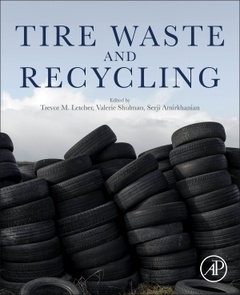Description
Tire Waste and Recycling
Coordinators: Letcher Trevor, Shulman Valerie, Amirkhanian Serji
Language: English
Keywords
Tire; tyre; recycling; reuse; recovery; reduce; recycle; composition; wear; usage; end-of-life; treatment; methods; processing; devulcanization; carbon black; concrete; applications; waste; scrap; rubber; elastomer; polymer; sustainability
650 p. · 19x23.3 cm · Paperback
Description
/li>Contents
/li>Biography
/li>Comment
/li>
Tire Waste and Recycling takes a methodical approach to the recycling of tires, providing a detailed understanding on how to manage, process, and turn waste tires into valuable materials and industrial applications. Sections cover fundamental aspects such as tire use, composition, trends, legislation, the current global situation, the possibilities for moving towards a circular economy, lifecycle options, treatment methods, and opportunities for re-use, recycling and recovery. Subsequent sections of the book focus on specific technologies that enable the utilization of waste tires in the development of high value materials and advanced applications. Finally, the future of tire recycling is considered.
This is an essential resource for scientists, R&D professionals, engineers and manufacturers working in the tire, rubber, waste, recycling, automotive and aerospace industries. In academia, the book will be of interest to researchers and advanced scientists across rubber science, polymer science, materials engineering, environmental science, chemistry and chemical engineering.
Part I. Introduction and Basic Information About Tires 1. An Introduction to Tires and Recycling 2. Tires and the Tire Market 3. Global Motorization: Increasing Tire Usage 4. Management of End-of-Life Tyres
Part II. Towards a Circular Economy 5. The 4 Rs: Reduce, Reuse, Recycle and Recover
Part III. Material Treatments and Technologies 6. Cryogenic Tire Recycling 7. Regeneration and Devulcanization 7a. Devulcanization 7b. In-Product-Sorting End of Life Tires for Effective Recycling by Devulcanization 8. Make Rubber, Sell Rubber: Building a Sustainable Industry 9. Pyrolysis 9a. Technologies Update Towards Recovered Carbon Black 9b. Recovered Carbon Black: Characteristics and Properties in Compounds 9c. Recovered Carbon Black: Potential Markets 9d. Recycling of Waste Tires for Silicon Carbide Production 10. Surface Modified Materials 11. Moulding Industrial Products from Tire Ground Rubber
Part IV. Key Markets for Recycling Materials, Products, Applications 12. Environmental Impact of Tires Used in Marine Construction 13. Civil Engineering Applications 13a. Surface Modification of Crumb Rubber by Cold Plasma for Performance Enhancement of Rubberized Asphalt 13b. Application of Rubberized Asphalt Mixtures in Low Temperature Environments 13c. Application of Rubberized Asphalt Materials: Chinese Experiences 13d. Quiet Pavements: A Novel Approach of Utilizing Rubberized Asphalt Mixtures 13e. Utilization of Crumb Rubber Modifiers in Producing Polymer Asphalt Emulsions 13f. Utilization of Rubberized Asphalt in the EU 14. Sports and Leisure Infrastructure and Applications 15. Roads to Opportunities 16. Construction: Acoustic Insulation in Buildings and Railway Applications 17. Reuse of Tyre Constituents in Concrete 18. Tire Derived Aggregate Applications in Civil Engineering
Part V. The Future 19. Green Public Procurement 20. Roads to the Future
Valerie L. Shulman is the Secretary General of the European Tyre Recycling Association (ETRA). The research she initiated in 1989 formed the nucleus of ETRA which was founded five years later. ETRA has over 250 member companies and organisations in 46 countries, worldwide. Dr. Shulman was a contributor to the Basel Convention Guidelines on Use Tyres (1999) and has represented the recycling industries at Waste Policy hearings in the European Parliament. She has participated in numerous research projects, prepared more than 100 articles in scientific and industry journals and authored or co-authored several books on tyre recycling technologies, materials and applications.
Dr. S
- Offers systematic coverage of tire recycling, covering composition, lifecycle, processing options, material developments and latest technologies
- Explains end-of-life-options in detail, considering approaches and methods for reduction, re-use, recycling and recovery
- Explores key application and product areas for recycled tire materials, from civil engineering, sports and leisure, to roads and transport, construction, automotive, and many more
These books may interest you

Rubber Recycling 74.82 €



